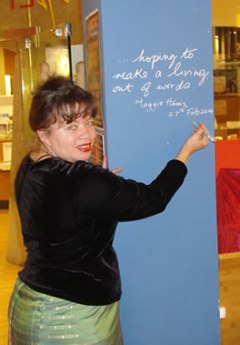Tags
Caribbean region winner, HopeRoad Publishing, maggie harris, Regional Commonwealth Short Story Prize 2014, short story
 Winning the Commonwealth Short Story Regional Award for the Caribbean is an immense honour, both to represent the Caribbean, and to allow my work to reach an international audience, as although I have been writing for more than 25 years I am still relatively unknown. The Caribbean’s multi-layered history still has stories to offer, and how we tell them is as important as what we write.
Winning the Commonwealth Short Story Regional Award for the Caribbean is an immense honour, both to represent the Caribbean, and to allow my work to reach an international audience, as although I have been writing for more than 25 years I am still relatively unknown. The Caribbean’s multi-layered history still has stories to offer, and how we tell them is as important as what we write.
I am an avid supporter of storytelling and oral history. This may be partly because I am a poet, and certainly because storytelling came to me at my mother’s knee, with jumbies outside, a board house, and the far away voice of radio. Yes there is a grandmother too, and oil lamps and outside toilets, and riverboats on the Berbice and Kwakwani rivers where my father, as a tugboat captain earned his living.
The voice of my story, Sending for Chantal is first person Caribbean English. It is set in Guyana but has universal similarities in this global world where migration still disrupts family life. As one whose own migration occurred in the early seventies, the break-up of family and social structures caused a foundation of loss which still underpins my writing. As a child being educated in Guyana, English Literature was an invitation to other worlds, an invitation which has never lost its appeal, and some of my childish scribbles made their way into the Berbice High School Magazine. But it wasn’t until I was 39 years old, as a mature student at Kent University, that I was to encounter those Caribbean writers who showed me my path – amongst them – Walcott, Brathwaite, Selvon, Agard, Hippolyte, Nichols, Senior, Goodison, Kincaid. Before that my scribbles remained sentimental expressions of passion, and my 20s and 30s were spent being a full-time mother exploring a variety of artistic genres.
Since the early 90s I have been dedicated to writing, sometimes supported by part-time teaching and literature promotion. After I won the Guyana Prize for Literature for my first collection of poetry, Limbolands, in 2000, I had this dream that I was going to walk into bookshops and see my book there! I had a lot of learning to do! What I did do though, was to create a platform that was not there, in the part of Kent where I lived. Poetry had become my voice, and I used it to create literary events which gave local writers a platform, inviting Caribbean and Black British writers like Jean Binta Breeze, Jackie Kay, Mark McWatt and El Crisis to share the emerging canon of our literature.
 Poetry had become a force; as performance, it was audience-friendly, inclusive and entertaining. It took me to Europe, to represent Kent, it even granted me two TV performances one of which came via a phone call when I was in St Lucia on a research project! But stories still enticed me, my first Caribbean story was included in Short Circuits, a littleBrown/ Virago anthology, and when Kingston University Press held a memoir competition, Kiskadee Girl was the result. A short story collection was to follow, Canterbury Tales on a Cockcrow Morning.
Poetry had become a force; as performance, it was audience-friendly, inclusive and entertaining. It took me to Europe, to represent Kent, it even granted me two TV performances one of which came via a phone call when I was in St Lucia on a research project! But stories still enticed me, my first Caribbean story was included in Short Circuits, a littleBrown/ Virago anthology, and when Kingston University Press held a memoir competition, Kiskadee Girl was the result. A short story collection was to follow, Canterbury Tales on a Cockcrow Morning.
I have had my share of rejections, but have been extremely lucky to have had as publishers creative visionaries who believed in me. Small presses do not have the resources available to do major promotion, but together we do what we can to promote my writing. I’d like to take this opportunity to thank Mango Publishing, Kingston University Press, HopeRoad Publishing, Cane Arrow Press and Cultured Llama for having faith in me. And for Commonwealth Writers for awarding me this prize.
My wish now is that this prize will encourage more people to seek out my work, and that it will inspire other writers never to give up!
